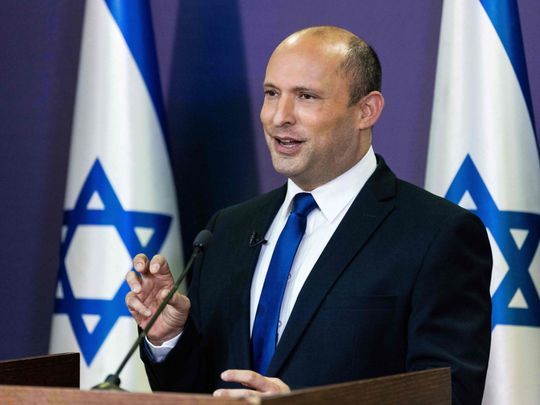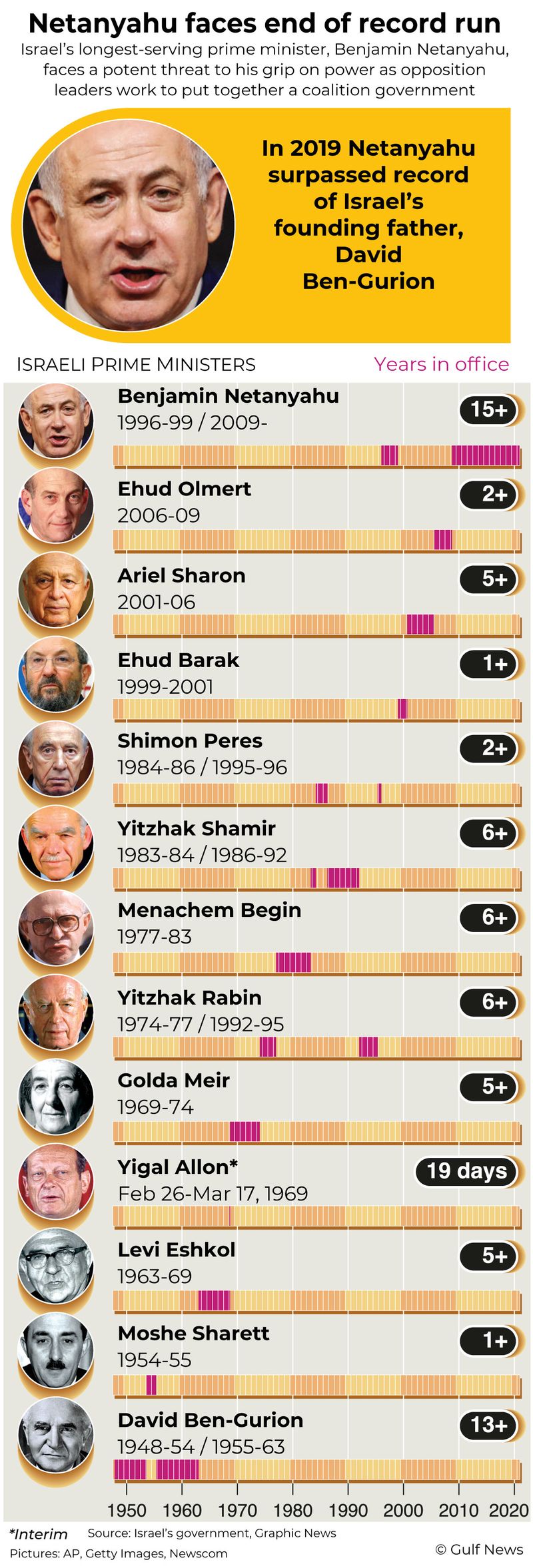
Tel Aviv: After 15 years in office and a run of four deadlocked elections, Israel’s longest-serving prime minister, Benjamin Netanyahu, could be unseated by a coalition of opposition parties, united by little beyond the desire to replace him.
Though still to be confirmed by Israel’s parliament, the deal on the table would make a former Netanyahu protege, Naftali Bennett, Israel’s next prime minister - at least for a fixed time, according to the terms of the bargain taking shape, before handing off to Yair Lapid, a centrist politician.
Though Bennett’s party trailed far behind both Netanyahu and Lapid’s in the last election, a rising push to oust Netanyahu in divergent quarters, amid political deadlock, has allowed him to emerge as a key power broker.
Here is what to know about Bennett, a technology millionaire turned far-right religious lawmaker, who is a staunch supporter of Israeli settlements and opponent of a Palestinian state. Bennett has made annexing parts of the West Bank a key aspect of his political agenda, he is currently making
Who is Naftali Bennett?
Bennett, 49, was born in Haifa, Israel, to American Jewish immigrants. He spent some time in the United States as a child and like Netanyahu speaks fluent, US-accented English. He is a modern-Orthodox religious Jew. If he becomes prime minister, Bennett would be Israel’s first religious head of state. He currently lives in the affluent city of Raanana, a suburb of Tel Aviv, with his wife and four children.
Bennett was an officer in an elite commando unit during his military service, which is required of Jewish Israeli citizens. In 1996, while serving in southern Lebanon, which Israel’s military then occupied, he and his unit were pinned down near the Lebanese village of Kafr Qana. As they tried to retreat, an Israeli artillery strike killed 102 Lebanese civilians taking shelter at a United Nations facility - an incident known as the Qana massacre.
Bennett went on to work in the tech industry and studied law at the Hebrew University in Jerusalem. By 1999, he had built his own start-up, a software company, and relocated to New York. In 2005, he sold his company, which produced anti-fraud software, to a US security firm for $145 million, according to Reuters.

How did he rise in Israeli politics?
Bennett entered Israeli politics in 2006 and served as a senior aid to Netanyahu until 2008. He is a generation younger than Netanyahu, 71, and reportedly left on rocky terms with his political mentor.
After departing the government, Bennett headed the Yesha Council, the main Israeli colonist movement in the occupied West Bank, which Israel captured in 1967 and Palestinians also claim.
By 2013 he had reentered Israeli politics as the leader of the struggling far-right Jewish Home party. Bennett revamped Jewish Home as a pro-colonist party and made calls to annex the West Bank, which would be illegal under international law, a key part of his platform. Bennett subsequently served as minister of defence, minister of education and minister of economy in Netanyahu’s government.
In 2018 Bennett teamed up with Ayelet Shaked, another firebrand of right-wing Israeli politics, to form the New Right party. The party initially did not pass the electoral threshold for entering Israel’s parliament in the 2019 election - the first of four deadlocked elections Israel has had in the past two years.
In the latest election in March, however, Bennett’s Yamina party, which New Right is part of, secured six of 120 available seats - enough to enter parliament and, in Israel’s current state, enough for Bennett even to become prime minister.
What are his policies?
Though he does not live in a West Bank settlement, Bennett has made annexing parts of the Palestinian territories a core part of his political program. Like many other top politicians in Israel, Bennett takes a hard line against Iran and supports liberal economic policies.
He has also become known for incendiary anti-Palestinian rhetoric. In 2015 he referred to the prospects of a Palestinian state as “suicide” for Israel and in 2014 warned Israel’s Arab citizens against becoming a “fifth column.” In another controversial statement in 2013, Bennett said that Palestinian “terrorists should be killed, not released”.
Bennett has expressed support for increased Jewish control over the Temple Mount compound, known by Muslims as the Noble Sanctuary, in Jerusalem’s contested Old City. Israeli police attacking Palestinians praying at the Al Aqsa Mosque last month in part sparked a wave of unrest and Israel’s 11-day war with Hamas in the Gaza Strip.
What impact could he have as prime minister?
In the near term, analysts predict that Bennett’s most ideological views would be contained by the constraints of the mixed-government deal on the table. He would be unlikely to push forward with his annexation plans, which would probably face opposition from President Joe Biden and from Israel’s newer Gulf Arab allies.
But if Bennett were to assume Israel’s highest office, his ascent would cement the rise of the next generation of far-right Israeli politicians.
So far, he has appeared to take a somewhat conciliatory stance.
“In the next years we need to put aside politics and issues like annexation or a Palestinian state, and focus on gaining control over the coronavirus pandemic, healing the economy and mending internal rifts,” Bennett told Israel’s Army Radio in November.
Israel, however, is deeply polarised along pro- and anti-Netanyahu lines. Since Bennett made his announcement Sunday, protesters have gathered outside his home, and police have increased his security detail following a rise in threats against him.








